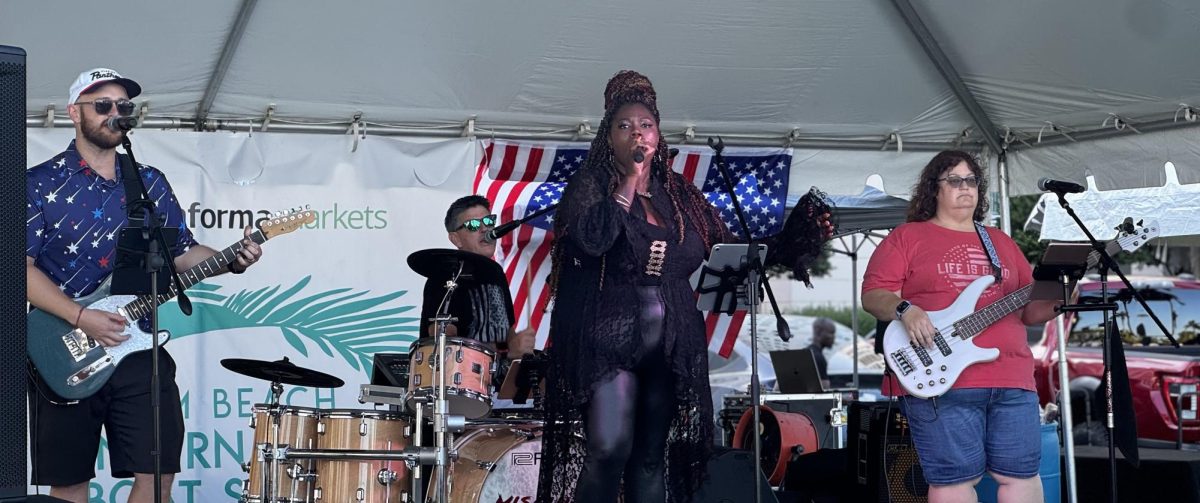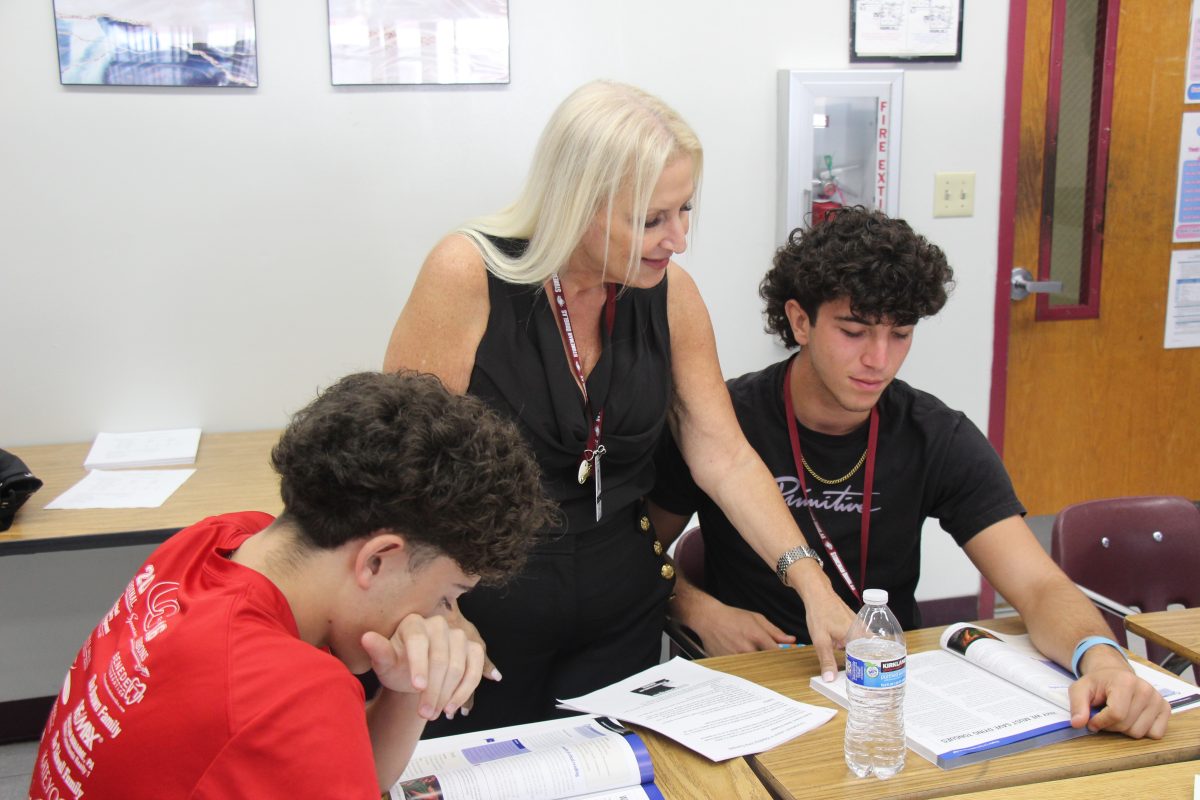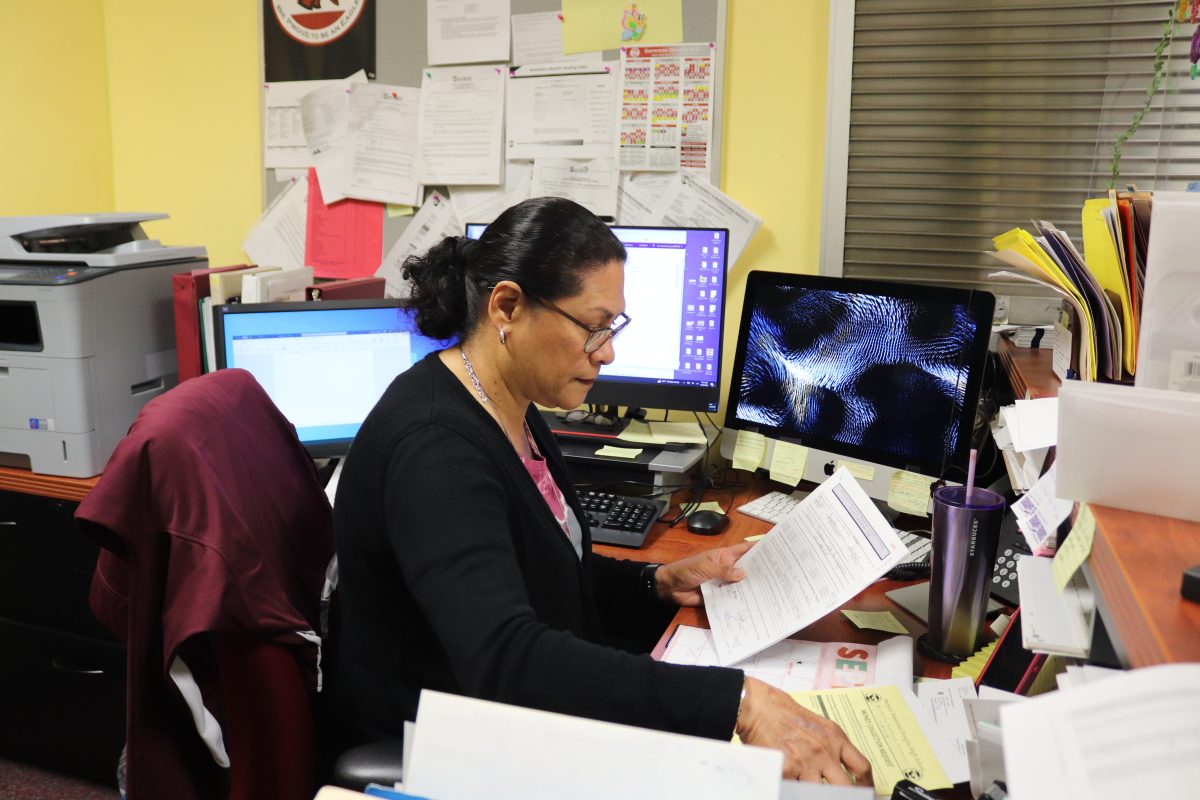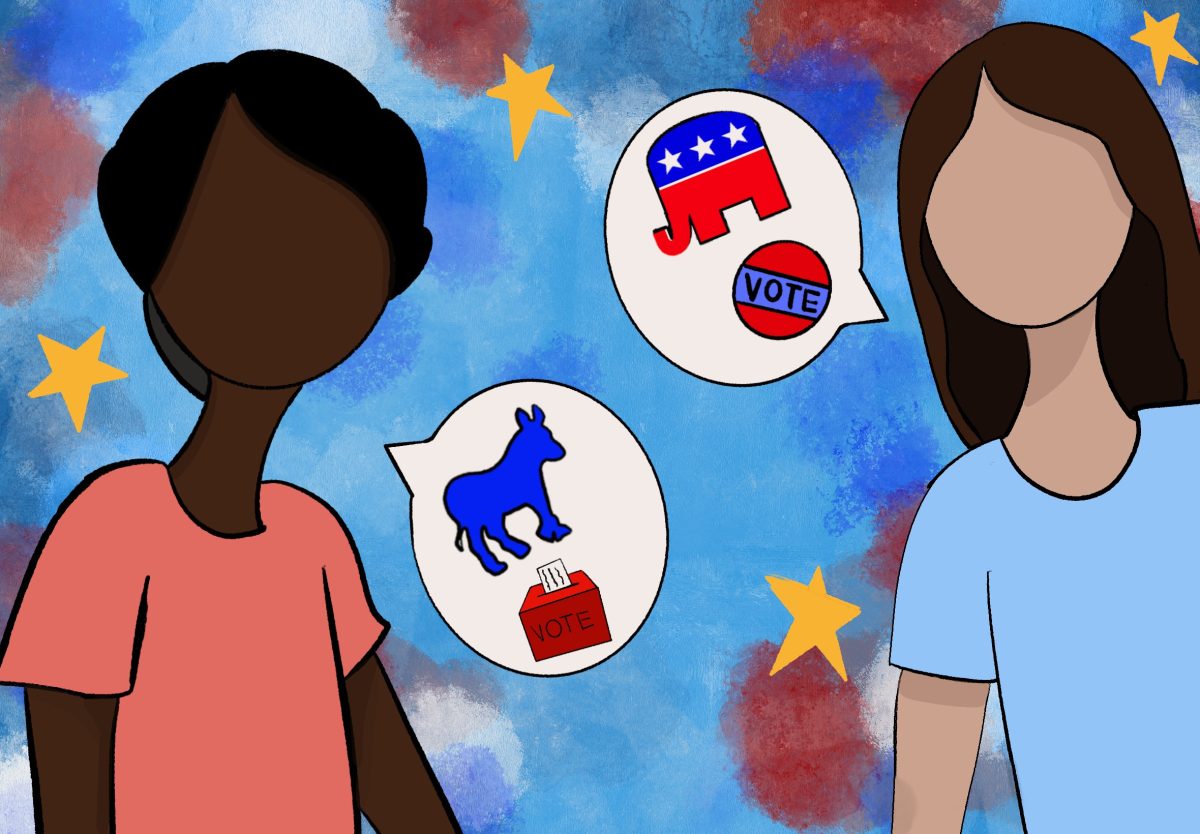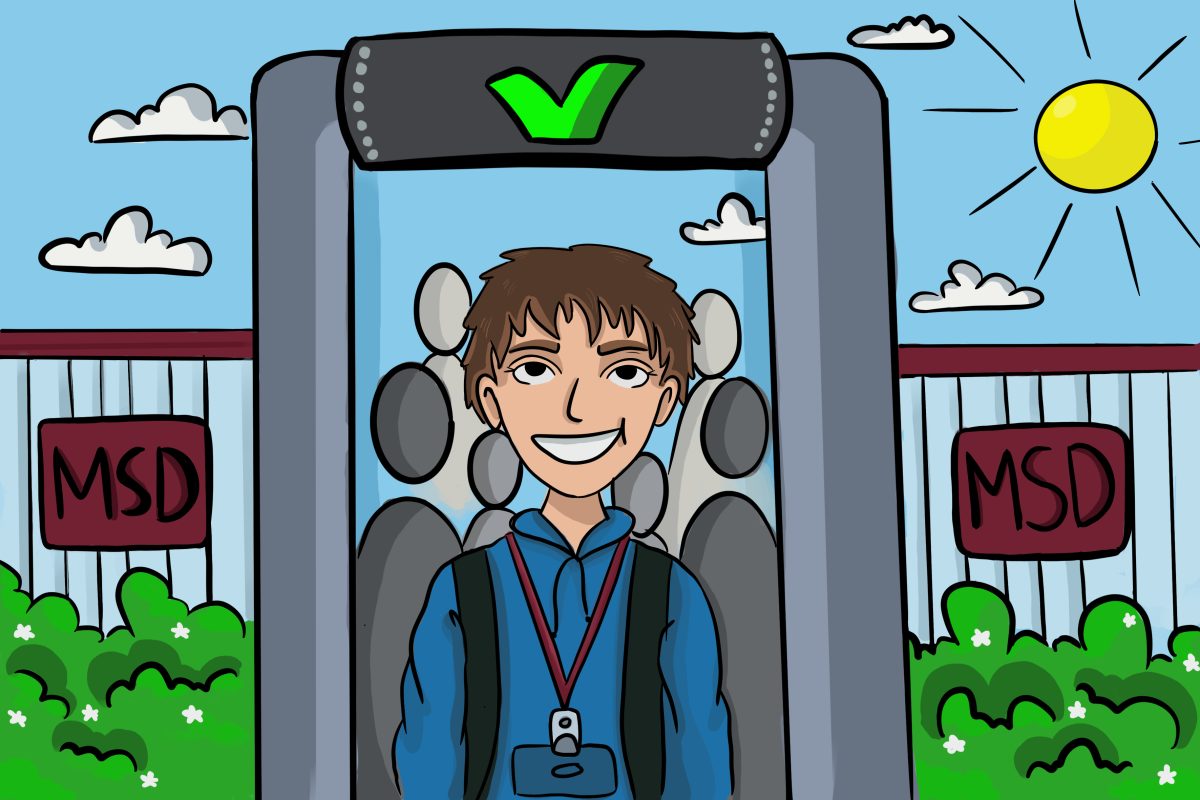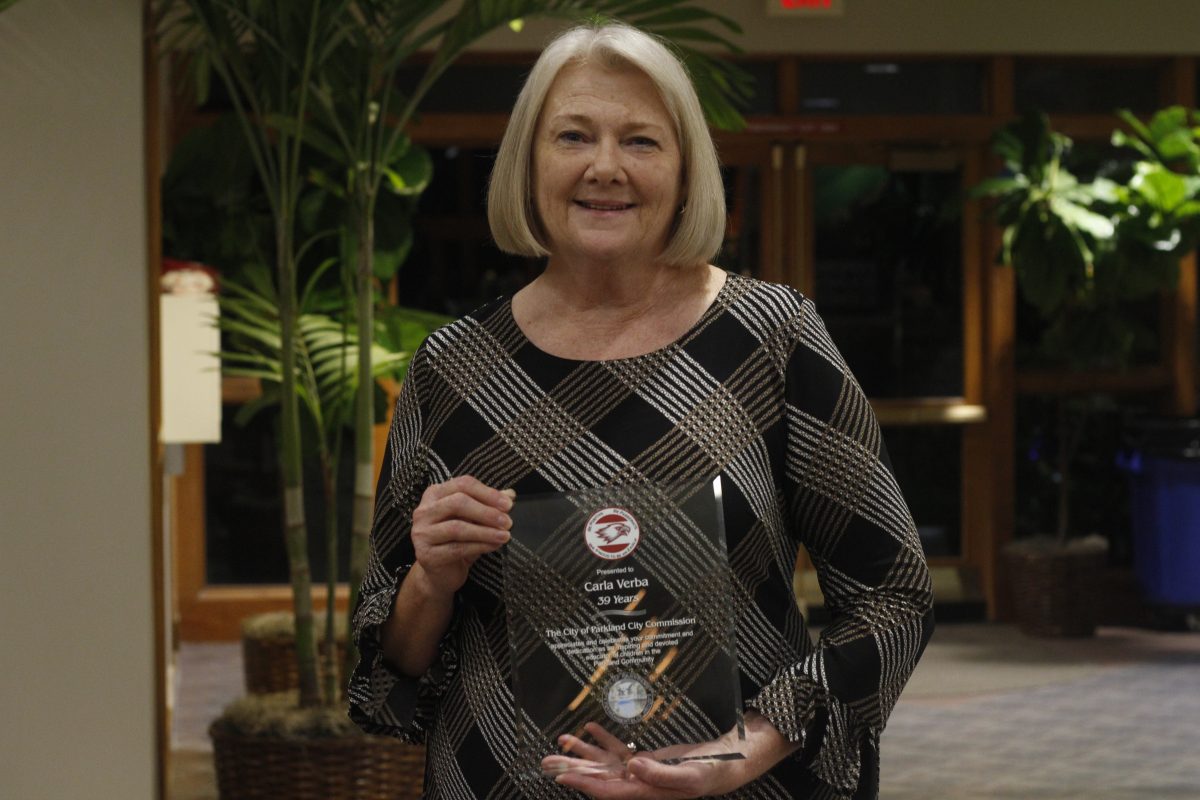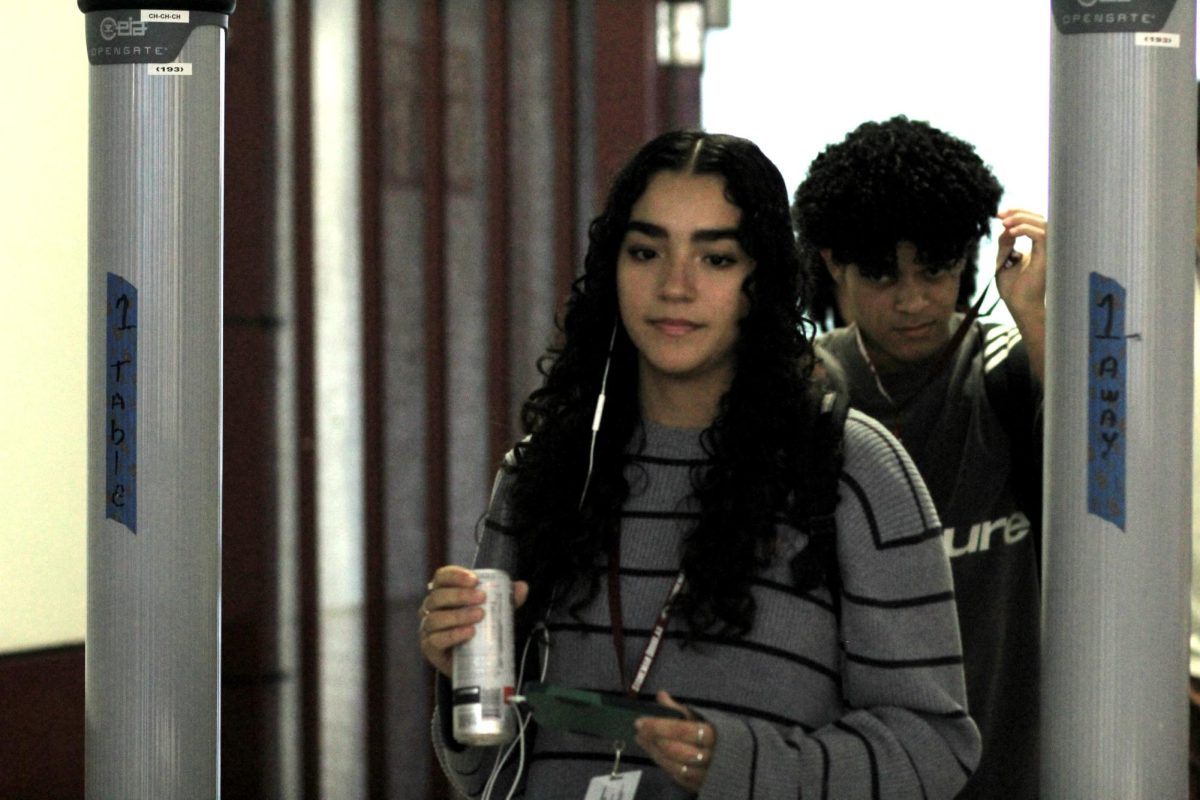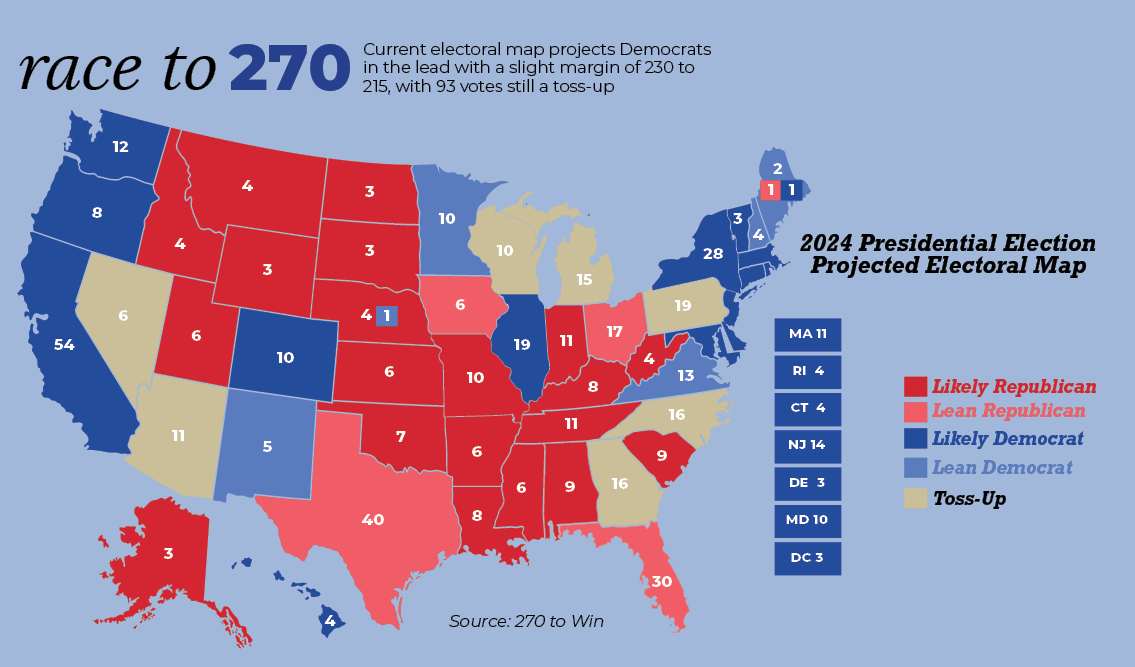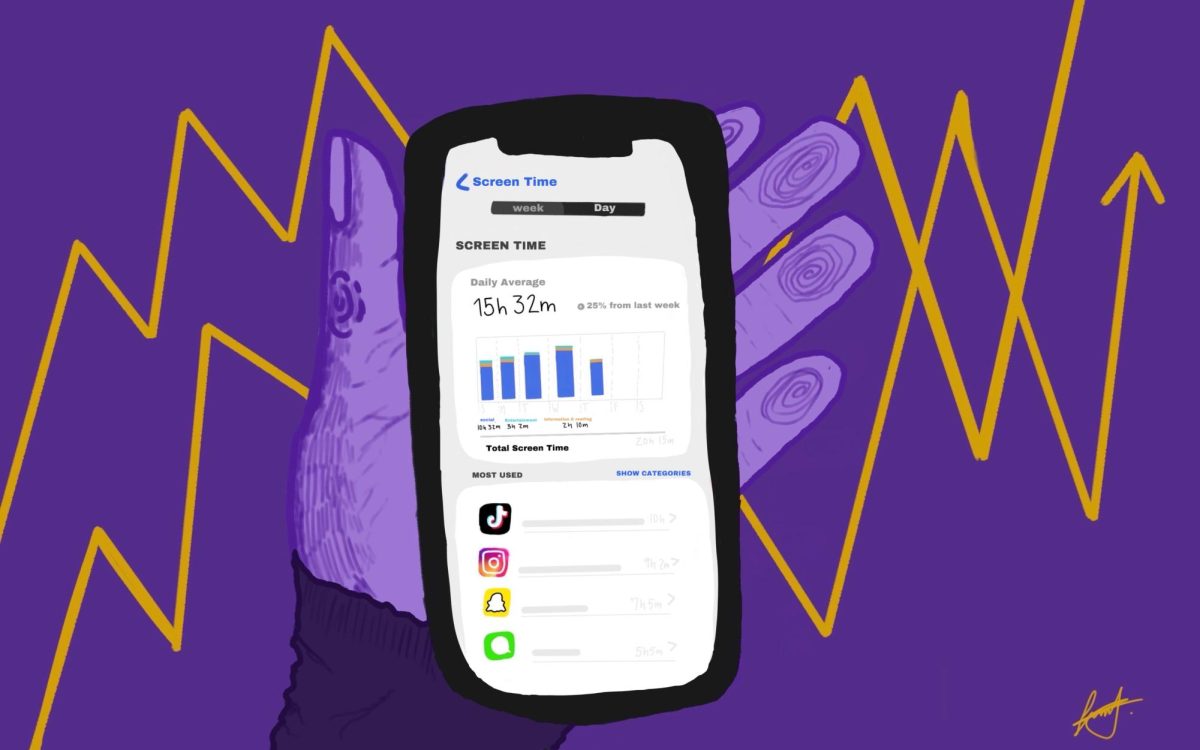*Names indicated with an asterisk were changed to shield the identity of the student or faculty member to protect their privacy
Conflicted, a student pauses outside the bathroom entrance. Weighing the risk of staying true to her identity against punishment, she remains standing there amidst inner turmoil. With the women’s room within inches of her, it is still so far out of her reach. Reluctantly making the decision to avoid trouble, she wills herself to take hesitant, dreadful strides towards the men’s room—betraying herself in the process. As she inches nearer and nearer, she cannot help but think about the fact that she does not belong in there; about how unfair it is that she is being forced to conform to others’ perceptions of her gender identity. Finally breaching the door, she resolves to never use a school bathroom again–until she can use the women’s restroom–because anything would be better than going through this unbearable pain again.
While local and state governments have frequently taken aim at the LGBTQ+ community over the last several years, the quantity has drastically increased. According to American Civil Liberties Union data, 496 anti-LGBTQ+ bills were introduced in state legislatures in 2023, up from 38 in 2018 when the ACLU began tracking anti-LGBTQ+ bills.
The state of Florida has been a leader in this specific category, among 17 other states with over 10 anti-LGBTQ+ bills introduced in 2023. The bills have addressed a wide variety of topics, including preferred names, pronouns, healthcare, bathrooms, sex education and sports.
Nicknames and Pronouns
Among several other new restrictions, Florida House Bill 1069 requires school districts to obtain parental permission for a student to be called any name other than their legal name by school personnel. This includes both preferred names and nicknames, which means that if a student named Isabella wished for their teachers to call them “Bella,” they would need to obtain a parent signature.
Dubbed the “Don’t Say They” law by its critics, HB 1069 updated and further extended the restrictions established by the 2022 law HB 1557, nicknamed the “Don’t Say Gay” law.
Parents across Florida were made aware of these name policy changes largely via emails by their school districts, roughly a week before school would start in their respective counties.
“To say I was shocked was an understatement. The form is blatantly targeting trans[gender] people that want to express themselves with their names,” freshman Theo Johnson* said. “Not only does it target trans[gender] people, but people that just like a nickname better than their actual name. The fact that a teacher can get in trouble for just calling someone a nickname or preferred name is terrible.”
In Broward County Public Schools, parental permission is required on the Emergency Contact Card that now has a line allocated for nicknames and preferred names. While Johnson*, who is genderqueer and prefers to go by a gender-neutral nickname, did obtain a parental signature, he is having issues with the processing of the paperwork and is currently being called his legal name by teachers.
“I can’t imagine my closeted friends find much acceptance or happiness in constantly being misgendered and deadnamed by their teachers everyday,” junior AJ Burrows said. “The repercussions teachers face if they call the student what they want to be called is absolutely insane to me. Why should someone lose their job simply for respecting someone? I think this whole thing feels like an attack on the queer community, specifically trans[gender] students.”
The policy is unpopular among MSD teachers. In a survey of 37 MSD teachers, 57% “strongly disagreed” with the preferred name and nickname policy.
“We all just feel like, when we talk about it… we all just feel that it’s ridiculous because, I mean, if today the nickname the student wants the teacher to call is ridiculous or offensive to some other people, then of course, we have our own judgment,” Advanced Placement Calculus teacher Chung-Chiang Feng said. “We all talk about this ridiculous legislation because basically, it took away that big possibility we can build a better relationship with the students. And I think that’s a key part because if we don’t want to build relationships, then they can all go to Florida Virtual School, right? You don’t have to have an interaction to students, go online. Take the lesson. Here, we are all human beings and want some interaction.”
While much of national media attention has focused on the nickname aspect of the new rule, it affects many transgender students who go by a name different from what was given at birth.
“I don’t think the media has covered the recent attacks on trans[gender] youth enough,” senior Sage Gregory said. “A lot of people don’t really know what’s going on right now because a lot of it is just being ignored.”
Gregory went on to say that the new laws were a source of anxiety for both them and their friends, particularly their friends “who aren’t out to their parents but were out at school.”
“I think this law is just thinly veiled transphobia,” senior Kurt Williams* said. “I haven’t seen any students who use actual nicknames complain about the new policy because parents can just write down nicknames they already call their kid. This law is only having a true impact on trans[gender] students who don’t have accepting parents.”
Williams*, who is a transgender man, has struggled with this in particular. His parents were not accepting of his identity, which he called both “really isolating” and “disappointing.” His mother refused to sign off on his chosen name being used by teachers.
“I don’t want to ask teachers to risk their career by using my preferred name, but I know most of them would if they were allowed to,” Williams said. “This law advocates for ‘parents rights’ but last year, several of my teachers called me by my preferred name and my parents weren’t affected in any way. This policy only hurts trans[gender] students and teachers that want to help them.”
Williams’ conclusion that his teachers would use his preferred name if allowed is one that rings true for 89% of MSD teachers, with another 8% reporting in an anonymous survey that they will continue to refer to a student by their preferred name regardless of the law. As a solution, Williams asked his teachers to refer to him by his surname; all of his teachers have complied with this request.
“I think if kids have a name they prefer to be called, then I think I should honor that if it’s not something outrageous or ridiculous,” Feng said. “If they want to be called something that is very, very bad words or something ridiculous, then that will be a different story, and we all have common sense.”
In the survey of MSD teachers, another teacher expressed similar sentiments as Feng about how teachers’ judgment should be trusted.
“The attack on the LGBTQIA+ community is the beginning of a fascist society,” the teacher wrote. “The Nazis attacked teachers [and] education first, which is what is happening here with book banning and the censorship of the historical truth of slavery and the direct attack on those who are not white, straight or ‘Christian.’ Teachers are professionals who should be trusted to educate.”
Sports and Bathrooms
Outside of names and pronouns, the Florida legislature has also passed other laws that affect transgender individuals, restricting their access to bathrooms, locker rooms and sports teams that correspond with the sexes they identify with.
Having taken effect on July 1, 2023, HB 1521, also known as the “Safety in Private Spaces Act,” banned people from using a bathroom or locker room that does not correspond to the sex assigned to them at birth. Not only did this law simply ban people from doing so, but in some cases even criminalized it.
This law impacts all K-12 schools, postsecondary educational institutions and many other public facilities in the state. As a result of HB 1521, these places are required to have at least one bathroom designated for use by the “male” sex and one designated for use by the “female” sex as per the laws definition of the word.
As stated by HB 1521, sex is the classification of males and females based on, “the organization of the body of such person for a specific reproductive role, as indicated by the person’s sex chromosomes, naturally occurring sex hormones, and internal and external genitalia present at birth.”
Alternatively, gendered bathrooms can be avoided if these institutions have at least one “unisex” restroom instead. The same rules apply to locker rooms and other changing facilities.
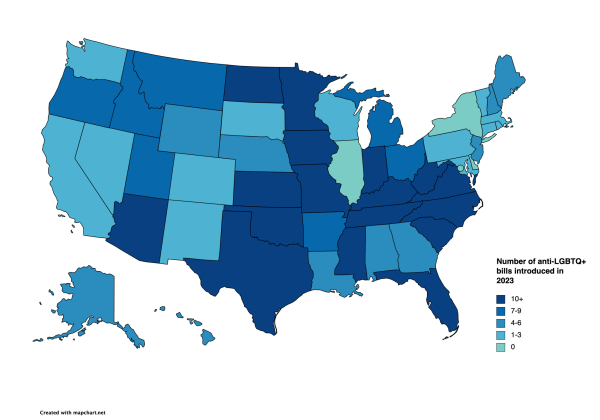
This poses many implications for transgender people. For one, it restricts them from entering the bathrooms and locker rooms of the gender they identify with and forces them to use the facilities of a gender they are not.
Additionally, many transgender individuals who have transitioned and done procedures and practices, such as voice training or surgery, outwardly appear as the sex they identify with, or are what is known as “passing” in the transgender community. Therefore, it would be difficult for them to use the bathroom of the sex assigned to them at birth without creating a disturbance.
“Not only is this law bigoted, it just does not work,” Williams* said. “Transphobic people seem to think they can always tell if someone is trans[gender], but the truth is that they can’t… HRT, surgery, voice training, etc, can make a transgender person look indistinguishable from cis people. If a transgender man follows this law and uses the female bathroom, it would be an outrage because society sees him as a man. This law does not take passing transgender people into account because they plan on passing more bills outlawing gender-affirming care and even socially presenting as a gender you weren’t assigned at birth.”
Furthermore, since it is a crime for an individual to enter a bathroom designated for use by the opposite sex, they can consequently be charged with a second-degree misdemeanor if they are 18 or older. While this only applies to adults, students under 18 will still face consequences that are written into schools’ disciplinary procedures. Broward County Public Schools, in their updated “Inclusive Schools Support Guide,” maintained that in compliance with state law, they will offer accommodations for unisex bathrooms or “changing facilities.”
The new “Inclusive Schools Support Guide” is 18 pages, down from 101 pages in the 2022-2023 school year. The former guide was LGBTQ+-specific and worked on in part by current MSD Principal Michelle Kefford when she was a principal at Flanagan High School.
“The work I did really started because I had two transgender students that came to the school from other schools as a result of being bullied,” Kefford said. “I became involved because I wanted to make sure that they felt safe and to make sure that it didn’t happen again to any child. I wanted to make sure that no child felt unsafe or bullied or would be in any way made to feel uncomfortable at school.”
SB 1028 or the “Fairness in Women’s Sports Act” also affects transgender individuals. This law went into effect on July 1, 2021 and barred transgender female athletes from playing on girls’ public school teams.
Proponents of the law argue that transgender women have an inherent advantage when compared to cisgender women, however recent studies dispute this claim. In fact, the Canadian Center for Ethics in Sports released a report based on its analysis of all existing scientific literature in English released in the years 2011-2021 that discuss transgender women participating in elite-level sports. The report concluded that, “trans[gender] women who have undergone testosterone suppression have no clear biological advantages over cis women in elite sport.”
Thus, many transgender individuals and LGBTQ+ rights advocates and organizations strongly oppose the law because they believe it is only another means by which to discriminate against transgender individuals. The Human Rights Campaign even took action against this by filing a federal civil rights lawsuit against SB 1028.
“It’s disrespectful, they’re women just as much as the rest of the competition and their teammates,” senior Lucas Davis* said. “It’s not fair to restrict them the way that they’re being restricted just because they used to have extra testosterone in their system… They worked just as hard as everyone else to be there. I’ve heard the argument that trans[gender] women are inherently stronger, but people have to realize that there are plenty of cisgender women who are just as strong if not stronger.”
This law has also received criticism for enforcing gender stereotypes and does not bar transgender men from playing on men’s sports teams, bringing about speculation as to why that is.
“I feel like the argument that trans[gender] women have a physical advantage is a way of enforcing gender roles by saying females are weaker than males,” Williams* said. “Trans[gender] men are rarely ever mentioned at all. This could be because they don’t see trans[gender] men as a threat to cis men. Either way, it forces sports fans to be critical of athletes’ appearances, making sure female athletes don’t look too masculine.”
If a female on a sports team decides that they have been deprived of an athletic opportunity or suffer any alternative forms of harm as a result of a violation of SB 1028, they are then permitted to pursue legal action.
“Don’t Say Gay” Laws
In June 2022, Florida Gov. Ron DeSantis signed HB 1557, also known as the “Don’t Say Gay” bill, into law. It went into effect on July 1, 2022 and restricted classroom discussions of gender and sexual orientation for grades K-3, citing those topics as “developmentally [in]appropriate.”
The law was later updated in 2023 with HB 1069 which removed gender and sexual orientation discussion up to eighth grade. For ninth through 12th grade, the discussion must be “age-appropriate or developmentally appropriate.”
This law led to BCPS cutting out sex education entirely for the 2022-2023 school year. The district has since released a survey to parents and teachers about what they consider to be age appropriate topics to teach; the survey included a question that asked whether students in grades nine through 12 should “receive instruction in gender identity and sexual orientation to include topics such as defining gender identity, sexual identity, explanations of the range of identities related to sexual orientation (e.g., lesbian, gay, bisexual, queer, transgender) and ways to show respect for people of all identities and orientations.”
“How will we be prepared to deal with many of these things in the real world if school won’t teach us?” Burrows said. “There ha[ve] been pretty good advancements in furthering financial literacy by making it a graduation requirement. So why can’t we do the same with the social aspects of life too?”
Supporters of the law fear that teachers are “pushing” or “indoctrinating” students to be LGBTQ+ through classroom discussion and open expression. One LGBTQ+ teacher argued against this narrative in the survey of MSD teachers.
Another controversial part of the 2022 “Don’t Say Gay” law is the part that would force teachers to “out,” as in forcing someone “out of the closet” without either their knowledge or consent, their students to their parents.
This section faced immediate backlash from both LGBTQ+ activists and educators. For many LGBTQ+ students, teachers are considered a safe place; 68% of MSD teachers have had students come out to them.
“This will kill kids, [Ron DeSantis],” former teacher and LGBTQ+ advocate Chasten Buttigieg tweeted following the introduction of the bill. “You are purposefully making your state a harder place for LGBTQ kids to survive in. In a national survey [by the Trevor Project], 42% of LGBTQ youth seriously considered attempting suicide last year. Now they can’t talk to their teachers?”
The concern of students not being able to come out to their teachers was a worrying one for many LGBTQ+ people because teachers became an outlet for students who cannot be out at home. In a survey of 334 MSD students, Eagle Eye News found that 20% of MSD students who are out to their parents do not have accepting parents.
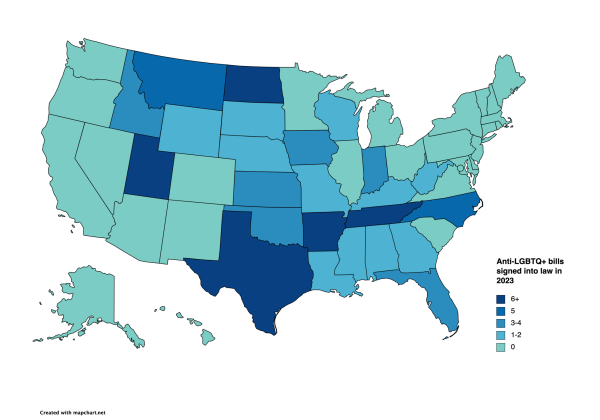
“Schools always put up propaganda about making all kids feel welcomed and adding these rules takes away from just that,” sophomore Camila Cifuentes said. “Kids that cannot come out at home can’t even come out in school.”
Not only do some students come out to teachers when they cannot come out at home, many come out in the hope of getting guidance from teachers on how to come out.
“In Taiwan now, it’s so open that you can see our shock and all the children’s shock [of Florida laws],” Feng said. “You know, you can see [transgender people] on a TV show, talk about how they go through the process and… gay people will go out to say how they come out to their parents. And of course, a lot of the time, they talk to their teacher first and the teacher guides them.”
Despite the violation of the law, 70% of MSD teachers surveyed would not out their students; another 27% were unsure.
“I’m not[going to out my student to their parents. That’s a big issue. That means they have a great trust in the teacher, and if we took away that trust, then what kind of relationship between will happen between the teacher and the student?” teacher Robin Smith* said. “I strongly believe that in order for me to be able to deliver my teaching material and instruction, I’ve got to have a good relationship with my students. When they are ready to choose to… talk to their parents about this, there will be times and places when they are ready. For me, I will never ever tell parents this information.”
Smith* later elaborated, stating he would deny a student came out to him were he to be facing consequences.
“This is a law; if a student comes to me, then we are obligated to say that, and that breaks the trust…” Smith* said. “And now obviously, since the law is in place… sometimes, you know, if we want to put ourselves out, ‘Okay, I hear you, but I didn’t hear,’ unfortunately.”
AP Psychology
In a move that was later reversed, the Florida Department of Education “effectively banned” Advanced Placement Psychology from being taught in Florida schools according to an Aug. 3 announcement by College Board.
Florida superintendents were instructed to remove any “foundational” content of gender and sexual orientation; AP Psychology includes this in Unit 6.7 in topics of gender, gender roles, stereotypes and sexuality.
“The reason Florida tried to ax AP Psychology is that they mention the LGBTQ+ community. I took AP Psych last year,” Williams* said. “It was in the unit about personality, identities and development. All they said was that LGBTQ+ identities are not chosen and are scientifically valid. How long did that lesson take? One class. It’s a pointless ban and helps no one, and luckily, this one didn’t make it to law, at least not yet.”
FLDOE reached out to College Board officials and asked them to remove this content. College Board refused, maintaining that removing the gender and sexuality content “would censor college-level standards for credit, placement and career readiness.”
“It’s part of the curriculum; you want to take a part out and you are only the state of Florida. You ask College Board to change that… internationally… Who are you?” Feng said. “Okay, if you don’t want to participate in that program, that’s fine, but I just found that it’s very, very disturbing to me that you [are] a state. You ask College Board, that has this curriculum and that is correlated to the college credit for all the universities, higher level, and you want them to take that last section out to fit your state law. And, regardless, these are international courses. I personally think it is very disrespectful, and I’m so glad… they kind of reversed it.”
Feng went on to emphasize the importance of gender and sexuality discussion in AP Psychology by comparing it to limits in AP Calculus AB, one of the three areas of math Feng teaches. Limits are the core subject of Unit One of AP Calculus AB and set the stage for later topics in the course, such as derivatives and integrals.
“Just for example, you can say if I’m teaching math, let’s say calculus: ‘Okay, let’s get rid of all the limits,’” Feng said. “Then, you took a very big foundation out. Of course, I cannot really compare math to psychology, but that’s a part of psychology.”
The ban of AP Psychology in all Florida high schools was later lifted and school districts could decide themselves if they would offer the course or not. BCPS opted to continue to teach AP Psychology, but now requires a parental permission form before a student enters the class.
Florida Virtual School, along with six other Florida school districts, still opted not to offer AP Psychology.
Book Bans
School library and classroom library books are another area of education greatly affected by recent Florida legislation. HB 1467, a law enacted last year, dictates that the books selected by schools to appear in their libraries must be “free of pornography and prohibited materials harmful to minors.” The prohibited materials referred to by the law include that of gender and sexual expression.
The language requiring novels containing talk of gender and sexuality expression to be removed from school libraries has caused controversy, as the LGBTQ+ community finds it upsetting.
Additionally, HB 1069 has made the process of challenging books and having them removed from school libraries much easier. New guidelines allow any county resident to challenge a book for any reason, which then results in that book being pulled off of school bookshelves until a decision has been made about its presence in the school’s library.
In the 2022-23 school year, Broward County has received a total of 12 book challenges–11 more than in the previous school year. As a result, nine of these books were banned across specific grade levels, and three of them were banned across all grade levels.
Of these 12 books, five were restricted to certain or all grade levels because of their gender identity content. The books were “This Day in June” by Gale Pitman, “Different Kinds of Fruit” by Kyle Lukoff, “It Feels Good to be Yourself” by Theresa Thorn, “George” by Alex Gino and “A Day in the Life of Marlon Bundo” by Jill Twiss.
The socially conservative group Moms for Liberty has been a driving force behind book challenges across Florida. The nature of many of the books they have challenged, has led a number of people to believe that the group is specifically targeting LGBTQ+ individuals.
“They’re targeting trans[gender] children and LGBTQ children and those kinds of themes,” Broward school board member Sarah Leonardi said in an interview with NBC 6 in January 2023. “I’m not seeing them target plays by Shakespeare, ‘Romeo and Juliet,’ which has extremely sexually explicit themes. I’m not seeing them target that.”
The banning of LGBTQ+ novels in Florida and across the U.S. has gained so much traction that it has even caught the attention of the Biden administration. In an effort to protect LGBTQ+ students, administrative officials have said that they will be establishing a book ban coordinator, who will train school districts and make them aware that their bans could become a violation of federal civil laws.
The PEN America’s Index of School Book Bans found that in the first half of the 2022-23 school year there were 1,477 instances of book banning in schools, affecting a total of 874 separate book titles. Of these books, over a fourth of them contained LGBTQ+ themes or characters.
Additionally, the American Library Association unearthed a similar trend when looking at the list they compiled of 2022’s most challenged books. “Gender Queer: a Memoir” by Maia Kobabe, was discovered to be the most challenged novel, mainly due to its LGBTQ+ content. Besides this novel, six of the others books on the list were also challenged due to their inclusion of LGBTQ+ content.
Florida is second only to Texas in the number of book bans that have been implemented across the state.
“There’s lots more of these [anti-LGBTQ+] types of laws in place or on the way,” Williams* said. “Ron DeSantis already restricted the books or media school libraries have access to, even in high schools and colleges. They restrict our First Amendment rights and make Florida a worse place to live overall. Sometimes I feel like I have to flee the state or even the country because of these harmful laws and politicians who only care about power and money.”
Still, Williams* is by no means the only member of the LGBTQ+ community who feels this way. Many LGBTQ+ organizations have raised concern over the ways in which book bans are disproportionately affecting LGBTQ+ youth across the state.
“More LGBTQ youth are out than ever before and banning books won’t change that but it sends a dangerous message about who belongs and is welcome,” Gay and Lesbian Alliance Against Defamation President Sarah Kate Ellis said in an interview with The Hill.
GLAAD and other similar organizations fear that schools, which were once considered safe places for LGBTQ+ students, are now becoming another place that rejects them and their identities.
Healthcare Access
The interaction of religious freedom and anti-discrimination laws have been considered a “hot button issue” in the last decade. Florida toes this line with its 2023 law SB 1580, or the “Protections of Medical Conscience” law.
SB 1580 allows healthcare providers to refuse to provide any healthcare services to someone on the basis of religious, ethical or moral beliefs. The law, while of a different subject, is reminiscent of a controversial 2023 U.S. Supreme Court decision, 303 Creative LLC v. Elenis, that allows a website designer to refuse to design wedding websites for same-sex wedding couples due to her religious beliefs.
“Today, the Court, for the first time in its history, grants a business open to the public a constitutional right to refuse to serve members of a protected class,” SCOTUS justice Sonia Sotomayor said in her dissenting opinion that Justices Elena Kagan and Ketanji Brown Jackson joined.
While the SCOTUS case specifically established that the plaintiff could legally refuse to provide content creation services on the basis of religious beliefs, the decision has created fear among the LGBTQ+ community that the ruling could be applied to other services.
Taking a page out of Texas’ book, the state of Florida enacted a complete ban on transgender minors accessing gender-affirming healthcare, such as puberty blockers and hormones, this year in Senate Bill 254. Violation of the law could result in the parent or guardian losing custody of their minor child if they allow them access to gender-affirming healthcare.
Gender-affirming healthcare is a label for a wide variety of healthcare that can look different for each person; however, the most common examples of gender-affirming healthcare transgender people utilize are puberty blockers for minors, hormone replacement therapy and gender affirmation surgery.
SB 254 went into effect on July 1, though in the months prior, there was a ban in Florida on transgender youth accessing gender-affirming healthcare from the Florida Board of Medicine and the Board of Osteopathic Medicine.
Critics of the law expressed their disagreement with the ban on gender-affirming healthcare for minors, specifically puberty blockers. They pointed out that puberty blockers have been used for decades for cisgender children that experience early puberty in children under 10 years of age and are reversible.
“GnRH analogues don’t cause permanent physical changes. Instead, they pause puberty,” Mayo Clinic said in an article about puberty blockers for transgender minors. “… When a person stops taking GnRH analogues, puberty starts again.”
This means that if a child believed they were transgender but ultimately realized they identified more with the sex they were assigned at birth, they could stop puberty blockers; their body would begin making their natural sex hormones again.
“What someone else’s kid does should be up to the child or parent, not the government,” Johnson* said. “Also… that the law prevents older teens, who are capable [of] mak[ing] good decisions, [from feeling] more comfortable in their body is disgusting.”
Johnson* is personally impacted by this legislation because he was planning to go on HRT “in a few years.” However, current Florida law prevents him, even though he has a family that supports his identity, from accessing this healthcare.
“The new law makes me devastated I can’t be comfortable in my own body anytime soon…” Johnson* said. “I am scared I won’t be able to be my true self my entire life. It is scary to think about.”
Johnson*’s concern about the ban affecting his gender expression for the rest of his life is one shared by many other transgender adults or minors hoping to access gender-affirming healthcare in the future. SB 254, while specifically targeting minors accessing gender-affirming healthcare, also increases barriers for transgender adults hoping to access gender-affirming healthcare.
Specifically, transgender adults must fill out an informed consent form in person to be prescribed HRT, in which a doctor must read to them the nature and risks of the medication. The law specifies that the form must be filled out with the physician “physically present in the same room,” which bans transgender adults from being prescribed their HRT or other gender-affirming medications via telehealth appointments.
“Making it harder for adults to receive it is horrifying, especially for adults who currently take it and have to suddenly stop an influx of hormones in their bodies,” Williams* said. “It could be really dangerous. It’s also so hypocritical of Ron DeSantis and his cabinet to approve laws like this while easing gun restrictions during an epidemic of mass shootings.”
Both Williams* and Johnson* described potential plans to “flee” the state or the country in response to anti-LGBTQ+ policies enacted in the state of Florida.
SB 254 also restricts transgender adults, specifically those who use Medicaid for health insurance, as the law banned Medicaid coverage in the state from including gender-affirming healthcare. A federal judge later struck this section down as unconstitutional and politically motivated.
The ban was met immediately with both backlash and a lawsuit. The lawsuit, Doe v. Ladapo, caused a federal court to temporarily halt enforcement of the ban while the suit awaits trial.
The cumulation of legislation focusing on LGBTQ+-focused issues and topics has begged the question for many on whether this legislation is a concerted effort to target LGBTQ+ youth and their educators.
Regardless of the intentions of the legislation, many educators have felt they have been placed in an unwanted, impossible situation, grappling with wanting to support their students that feel targeted by legislation while not wishing to risk their teaching license.
“It’s all for students,” Feng said. “The bottom line is we’re here for students, not for politics. That’s the bottom line.”
This story was originally published in the October 2023 Eagle Eye print edition.

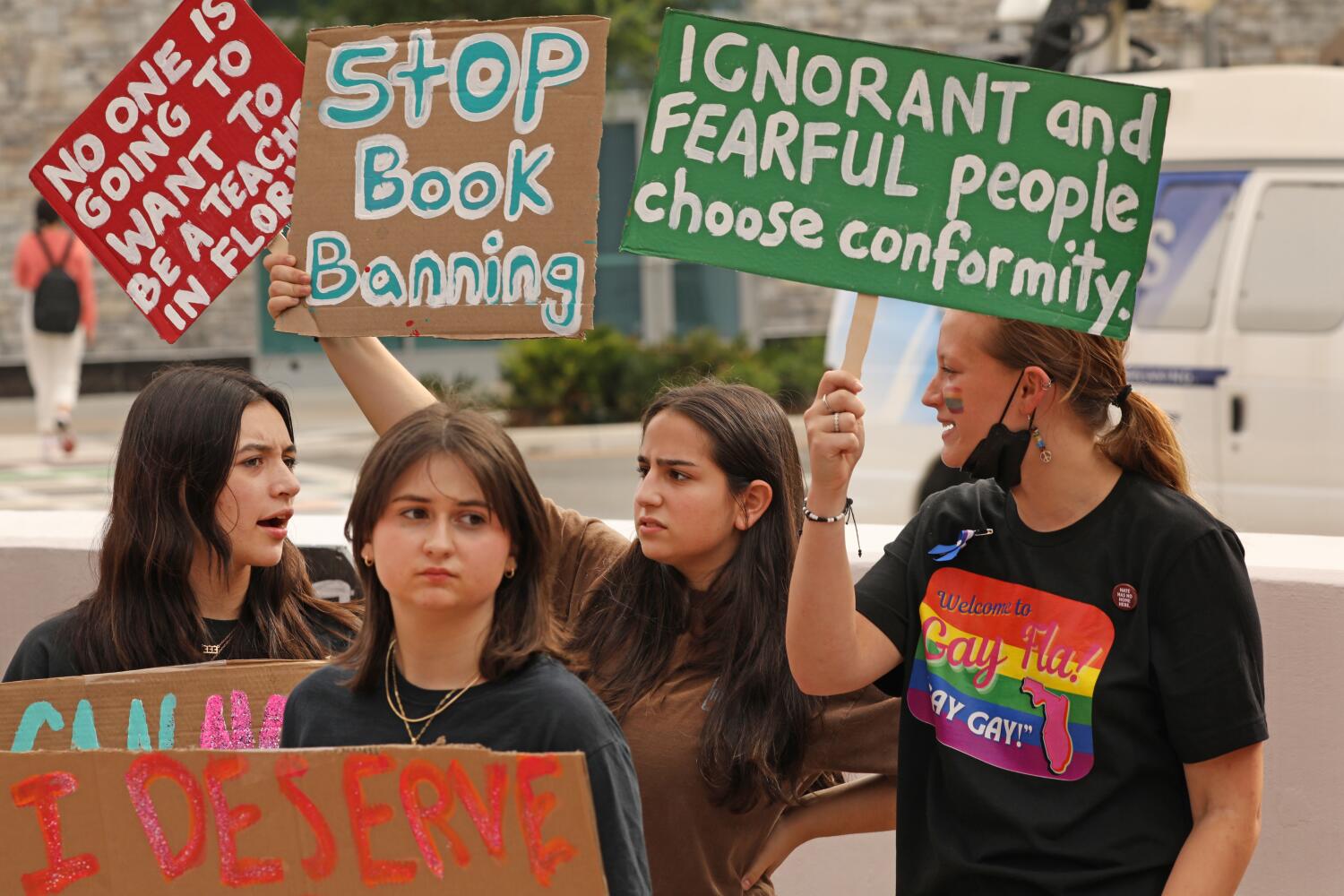




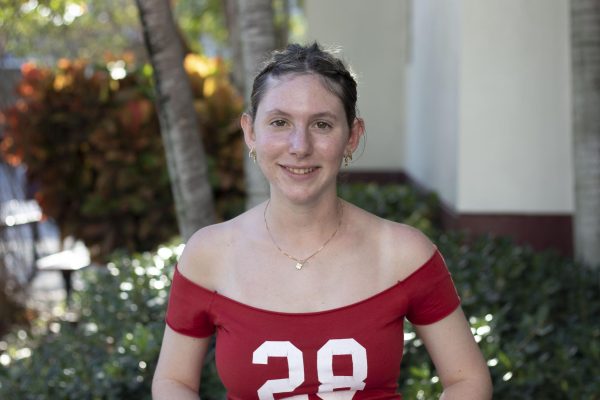

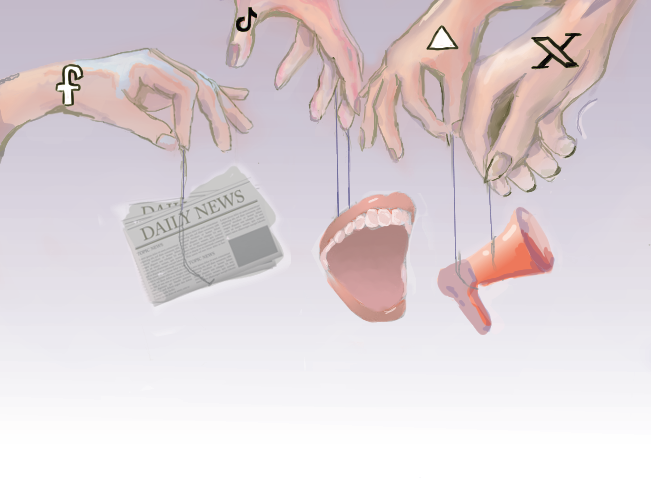




![National Honor Society Sponsor Lauren Saccomanno watches guest speaker Albert Price speak to NHS members. National Honor Society held their monthly meeting with Price on Monday, Nov. 4. "[Volunteering] varies on the years and the month, but we have started a couple new things; one of our officers Grace started a soccer program," Saccomanno said. "We have been able to continue older programs, too, like tutoring at Riverglades. NHS's goal is to have as many service projects as possible."](https://eagleeye.news/wp-content/uploads/2024/11/xNOeKNVwu7aErpVyJHrHogagZUUcLLosjtbIat94-1200x900.jpg)

![Ice Ice Baby. Skating to "Waltz" and "Romance" during her long program, figure skater Ava Zubik competes at the Cranberry Open in Massachusetts on Aug. 12, 2022. She scored a total of 86.90 on her short and free skate program, earning fifth place overall. "I try to make it [competing] as fun and enjoyable as I can because it's my senior year, and so I want to really enjoy competitive figure skating while it lasts," Zubik said.](https://eagleeye.news/wp-content/uploads/2024/11/skater1-799x1200.jpg)
